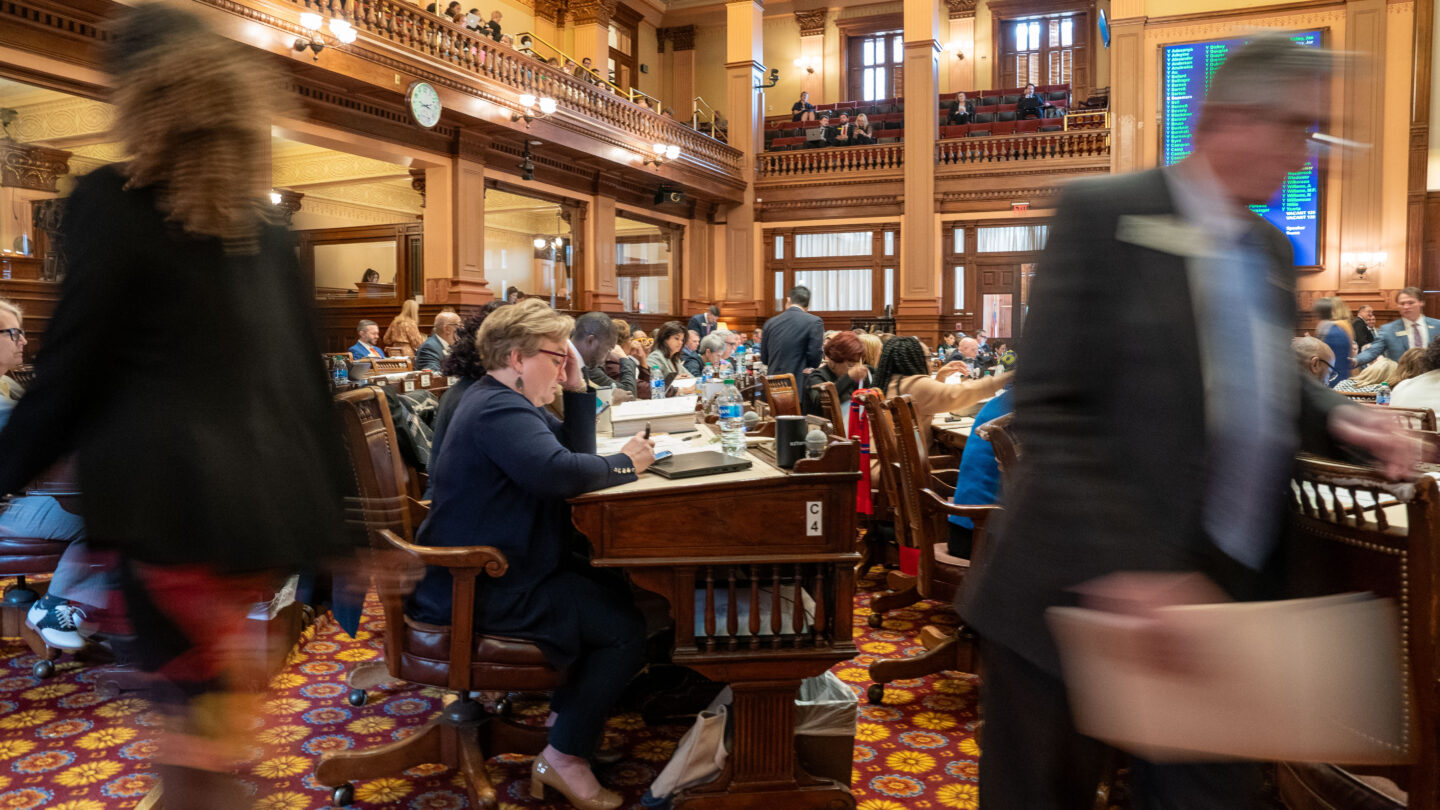This coverage is made possible through a partnership between WABE and Grist, a nonprofit environmental media organization.
The Georgia General Assembly wants to suspend tax breaks for high-tech data centers and won’t extend extra benefits to cryptocurrency mining operations. These operations rely on large banks of computer servers that use huge amounts of energy – a concern that was on lawmakers’ minds as they passed the data center bill and failed to advance the crypto measure.
State lawmakers also set out an election schedule for the state’s Public Service Commissioners. Voting for the elected officials who regulate utilities has been on hold for years as a voting rights challenge has moved through the courts.
Another measure, which would have re-established a public advocate for utility issues, failed to pass the House.
The legislative session that ended last week coincided with Georgia Public Service Commission hearings to address an extra request from Georgia Power for more electricity, as well as a candidate qualifying period in which some were surprised to learn the PSC would once again be left off the ballot.
Dig deeper: learn how energy regulation and policy work in Georgia
The bills that passed, and are now awaiting Gov. Brian Kemp’s signature, seek to remedy both issues.
Data center powerup
You’re using data every time you send an email, go to a Zoom meeting or stream a movie. It has to come from somewhere — generally, a data center full of computer servers.
“Data centers enable the apps, platforms and services that we use personally and professionally every day,” Josh Levi of the Data Center Coalition told WABE as the data center bill worked its way through the legislature. “They keep us connected in our modern lives.”
In 2018, Georgia introduced a tax break for data centers: a sales tax exemption for their equipment. Since then, data center construction has exploded in metro Atlanta, according to real estate services firm CBRE.
Levi said data centers give rise to other businesses, from IT maintenance to HVAC to security.
“They tend to develop and expand entire ecosystems around them,” he said.
But they also need a lot of power to run. In Georgia Power’s request to make and buy more electricity to support a spike in demand from new businesses, the state’s largest electric utility said 80% of that need comes from data centers.
The request led state lawmakers to second-guess the tax break.
“Well, better late than never,” Mark Woodall, legislative chair for the Georgia Chapter of the Sierra Club, said in response to the idea of establishing a commission to study incentives for data centers now instead of considering potential consequences before establishing the tax break.
“We got a big mess here,” Woodall said. “And the first thing we can do is quit digging the hole.”
Lawmakers ultimately passed a bill that would suspend the tax break and create a special commission on data centers.
Opponents of the bill argued it would hurt job growth and economic development.
In the meantime, as lawmakers wrapped up the legislative session and the data center bill sat on Gov. Kemp’s desk, the PSC’s staff announced a deal with Georgia Power that would grant much of the utility’s energy request, including building new electricity turbines to be powered with oil and natural gas.
Public advocates
The PSC’s Public Interest Advocacy staff negotiated the proposed deal with Georgia Power, a group that also received some attention during the legislative session.
A bill passed the Senate that would have re-established a role called the Consumer Utility Counsel, whose job is to advocate for utility consumers’ interests. The position was eliminated in the widespread state budget cuts of 2008.
Before a House committee, a representative of the PSC argued that the proposed public advocate wasn’t necessary because the PIA staff had already filled that role. When the proposed deal was announced days later, some opponents of Georgia Power’s plan questioned whether the PIA staff was adequately representing the public.
Potential end tog election limbo
The PSC, which is made up of a group of five election officials, oversees Georgia Power’s energy generation plans as well as electricity rates for the utility’s customers.
But those officials haven’t been on Georgia ballots since the runoff election in January 2021, while a Voting Rights Act lawsuit is pending.
In a late-in-the-session substitution, after Crossover Day, a Senate committee swapped out an already-passed House bill on EV charging taxes for one that seeks to resolve this ongoing state of limbo.
The measure passed and is awaiting the Governor’s signature.
Under this bill, the current commissioners would continue to serve until elections are held for their seats. The bill lays out a schedule for those elections beginning in 2025.
The bill’s author, Senate President Pro Tempore John Kennedy (R – Macon), said it was important to maintain the commission’s staggered pattern of elections so that a majority of seats aren’t up for a vote all at once.
But opponents objected to the extra-long terms the current commissioners would serve under this plan – eight or nine years between elections in some cases, instead of the typical six. They said voters should be able to weigh in as soon as possible on this powerful state commission.
“We want elections to go forward as soon as possible under a system that doesn’t discriminate against Black voters in Georgia,” said Bryan Sells, a lawyer for the plaintiffs in the federal lawsuit.
That lawsuit challenges how Georgia conducts its PSC elections.
The commissioners have to live in specific districts, but they’re elected by voters statewide. A group of Black voters in Atlanta argued in their lawsuit that this violates Section 2 of the Voting Rights Act because it dilutes their votes, preventing them from sending the candidate of their choice to the commission.
A federal judge agreed in 2022 and suspended PSC elections until the state legislature could devise a new system. In November 2023, the 11th U.S. Circuit Court of Appeals reversed that decision.
The plaintiffs appealed the 2023 ruling to the U.S. Supreme Court last week. There’s no guarantee the court will take the case.








